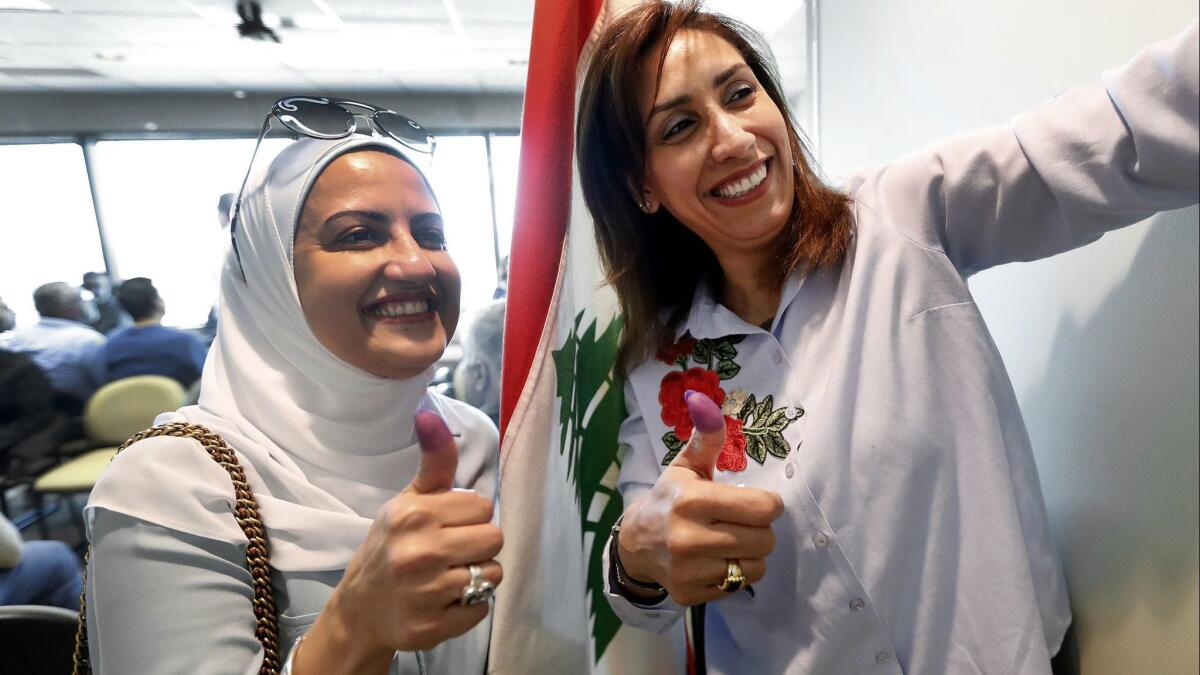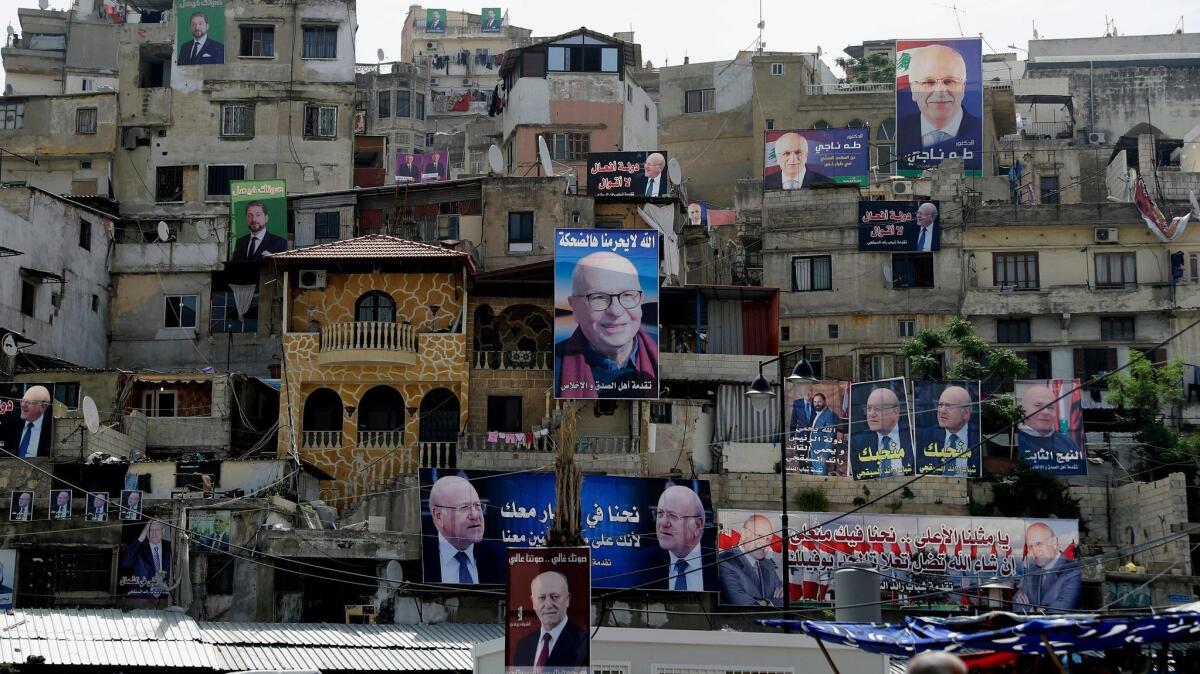Amid warnings about vote buying, Lebanon holds first parliamentary elections in nearly a decade

- Share via
Reporting from Beirut — At first glance, the political poster appears to declare a cynical message: “Things are not going to change.”
But look closer, and you’ll find a slash over the “not.” The poster, adorning a grungy wall in Beirut’s eastern district, then exhorts voters to cast ballots in Lebanon’s parliamentary elections Sunday, the country’s first in almost a decade.
The possibility of change — or lack thereof — has become the central theme of this election season.
Contenders disparage the status quo every chance they get, whether they’re decades-old groups, such as the Lebanese Forces party (which adopted “the pulse of change” as its main slogan) or scrappy first-time challengers, such as Paula Yacoubian (a journalist turned politician who declared, “Now is the time for change, we have reached the pits!”).
But a raft of new candidates is seeking to capitalize on people’s anger, as the country is in the throes of an ongoing garbage crisis (which began in 2015 and still results in piles of trash sprouting across Lebanon), shoddy public services and a parliament long dismissed as comically inept even as it extended its four-year mandate no less than three times.
Many have pinned their hopes for a shakeup on the country’s new (some would say overly complicated) electoral law that was ratified in 2017.
Previous elections offered little in the way of surprise: 128 parliamentary seats were divided among the country’s always-bickering 18 sects, with each group guaranteed a place based on sectarian quotas. Elections were based on a winner-take-all system — the party that got the most votes in a district got all the votes of that district.
The new law mandates proportional representation for 15 districts — down from the previous 22 — while allowing the thousands of Lebanese living abroad to vote for the first time.
It also forces candidates to run as part of lists, with the aim of moving away from personality cult and sectarian politics and focusing instead on the political programs the different groups have to offer.

Voters will have the chance to pick from 77 lists comprising 583 candidates, including 84 women, a record in a country where female parliamentary participation is also governed by quotas. Once they vote for a list, they can also give an additional “preferential” vote to one candidate within that list.
The new law has already prompted some unusual political alliances.
Lebanese political factions have long coalesced into two broad camps: On one side was the pro-U.S. and pro-Saudi March 14 coalition led by Lebanese Prime Minister Saad Hariri. On the other was the March 8 alliance, which is headed by Michel Aoun, the country’s president, and includes the Shiite Muslim faction Hezbollah; the group’s armed wing is designated as a terrorist entity by the U.S. (The dates refer to major protests for and against the Cedar Revolution, which led to Syria’s exit from Lebanon.)
But redistricting calculations have forced adversaries to work together, said Sima Ghaddar, a Beirut-based contributor to the Century Foundation think tank. The competitors have banded together on the lists, so as to get the largest number of votes in an area, then compete for the preferential vote.
“It makes you create new alliances but forces no shifts in politics,” Ghaddar said.
Though the new law looked “very promising” on paper, said Hicham Haddad, host of a popular political satire TV show, “when you dig into the details, you discover the possibility of making a difference, especially for civil society parties, is negligible.”
“Those alliances are made in a way between the traditional groups to make sure that non-traditional groups can’t join,” Haddad said.
“Even if they don’t agree on anything, they allied in such a way that no one else can get the votes. Even their disputes were calculated. They decided to fight within the traditional groups and not bring anyone from outside,” he said.
Another theme in this election season: Everything old is new again: A few dozen — 37 by one count — of those running are third- or even fourth-generation members of political dynasties, even as many claim to be dissatisfied with the policies enacted by their forebears.
First-time hopefuls face an uphill battle as incumbents leverage the perks of political office to feed into their electoral campaigns. Hariri, for example, used a military helicopter for campaign purposes, critics say.
The massive funds in the hands of the traditional groups, said Ali Abdallah Fadlallah, a Beirut-based political expert, are another factor working against independents.
“Campaign spending of the size we’ve seen cancels the effects of the new law,” Fadlallah said.
Factions have organized elaborate parades, showcasing their candidates with dramatic entrances with music, dancing and rousing speeches to rally party loyalists. One incumbent, Lebanese Foreign Minister Gebran Bassil, invited ridicule when he arrived at one event atop a donkey.
The lavish spending has appeared in other ways.
In recent weeks, the country’s political elite have become a virtually inescapable sight, their faces (many of them grim, as if channeling Marlon Brando in “The Godfather”) covering the walls of buildings, hanging from electricity poles or crowding large billboards on cities’ thoroughfares.
Meanwhile, Beirut’s Rafik Hariri Airport has been flooded with arrivals in recent weeks. Although expatriates can now cast ballots from abroad — and voting already has begun in some countries — many are returning home to vote.
“They’re coming here for the elections. Parties pay for their ticket to come in from abroad to vote,” said one airport employee recently, waving a dismissive hand as she walked past lines of passengers at passport control.
Allegations of vote buying are rampant — because it’s happened in the past.
Ghaddar said that although the price of a vote has increased compared with the 2009 election, the phenomenon is still prevalent enough that the Four Knights, a Lebanese boy band composed of four middle-age men, released a music video urging people to “not let anyone steal your vote.”
“How can you accept for someone else to speak for you?” they crooned. “My hand is with your hand, stand up and we’ll write another story.”
President Aoun echoed their message in a televised address on April 25 directed at voters in Lebanon and abroad.
“Do not vote for those who pay you or offer you money, because those who buy you will later sell you…. Do not believe he who gives you promises that are against reality and ability, because he will not achieve what he promised,” he said.
“And remember that election promises are binding only for those who believe them.”
Yet despite the challenges, some, including Yacoubian, the newcomer who is running for a seat in Beirut, is confident that people are fed up and ready for change.
“Nine years they fed us garbage, with failure after failure…. We have to get out of this by changing the people who put you in this level, those who are responsible for this failure,” she said.
“If people understand that, then they’ll vote for someone new.”
Bulos is a special correspondent.
Twitter: @nabihbulos
More to Read
Sign up for Essential California
The most important California stories and recommendations in your inbox every morning.
You may occasionally receive promotional content from the Los Angeles Times.











